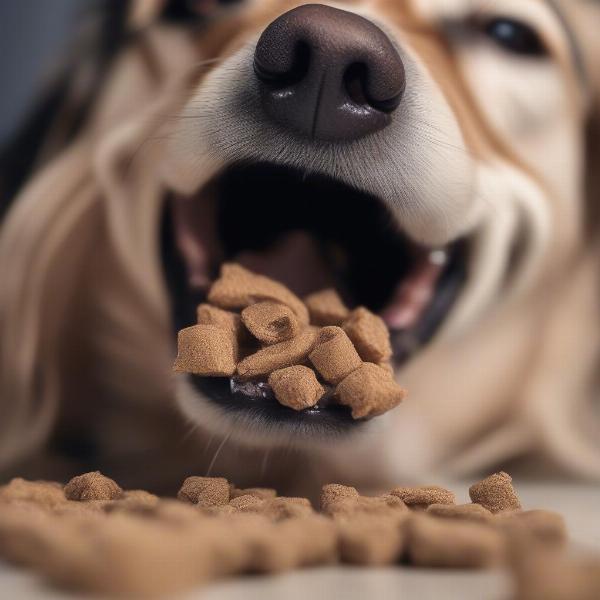Dental pain in dogs is often a hidden problem, as our canine companions are masters at masking discomfort. However, untreated dental disease can lead to serious health issues, impacting their overall well-being. Understanding the subtle signs of dental pain and knowing how to address it is crucial for responsible dog owners.
How to Tell if Your Dog Has Dental Pain
Recognizing dental pain in dogs can be tricky, but there are several telltale signs to watch for. Changes in eating habits, such as dropping food, chewing on one side of the mouth, or reluctance to eat hard kibble can indicate discomfort.  Chó không muốn ăn hạt cứng You might also notice excessive drooling, pawing at the mouth, or a reluctance to play with chew toys. Bad breath is another common indicator, often accompanied by visible tartar buildup or red, swollen gums. In some cases, dogs might exhibit behavioral changes like increased irritability or aggression, especially when their face is touched.
Chó không muốn ăn hạt cứng You might also notice excessive drooling, pawing at the mouth, or a reluctance to play with chew toys. Bad breath is another common indicator, often accompanied by visible tartar buildup or red, swollen gums. In some cases, dogs might exhibit behavioral changes like increased irritability or aggression, especially when their face is touched.
Common Causes of Dental Pain in Dogs
Dental pain in dogs can stem from various issues, the most prevalent being periodontal disease. This infection of the gums and supporting structures of the teeth is caused by plaque and tartar buildup. Other common causes include fractured teeth, abscesses, gingivitis, and retained baby teeth. Less common but equally painful conditions include oral tumors and foreign bodies lodged in the mouth.
What to Do If You Suspect Your Dog Has Dental Pain
If you suspect your dog is experiencing dental pain, the first and most crucial step is to schedule a check-up with your veterinarian. They will perform a thorough oral examination and may recommend dental X-rays to assess the extent of any underlying problems. gifts for senior dogs Early diagnosis and treatment are key to preventing further complications and ensuring your furry friend’s comfort.
Treating Dental Pain in Dogs
Treatment for dental pain varies depending on the underlying cause. Your veterinarian may recommend a professional dental cleaning under anesthesia to remove plaque and tartar buildup. complications from dog dental cleaning In cases of fractured teeth or severe periodontal disease, extractions might be necessary. dog dental operation Pain medication and antibiotics are often prescribed to manage discomfort and prevent infection.
Preventing Dental Pain in Dogs
Prevention is always better than cure when it comes to dental health. Regular brushing with dog-specific toothpaste is the cornerstone of preventative dental care. Providing appropriate chew toys can also help remove plaque and tartar buildup. Dental treats and diets specifically formulated for dental health can further contribute to maintaining good oral hygiene. grilled bacon wrapped hot dogs
Conclusion
Dental pain can significantly impact a dog’s quality of life. By understanding the signs, causes, and preventative measures, you can ensure your canine companion enjoys a healthy and pain-free mouth. Regular veterinary check-ups and proactive dental care are essential for maintaining your dog’s overall health and well-being. Don’t hesitate to contact your veterinarian if you suspect your dog is experiencing dental pain. how do i know if my dog has tooth pain
FAQ
- How often should I brush my dog’s teeth? Ideally, daily brushing is recommended.
- What type of toothpaste should I use for my dog? Always use toothpaste specifically formulated for dogs, as human toothpaste can be toxic to them.
- Can I give my dog bones to help clean their teeth? Cooked bones should never be given to dogs, as they can splinter and cause serious injuries. Some raw bones can be appropriate, but consult your veterinarian for recommendations.
- Are there any signs of dental pain in dogs that are easy to miss? Yes, subtle changes in behavior, like decreased appetite or reluctance to play, can sometimes be attributed to other issues. Always consult your vet if you notice any changes in your dog’s normal behavior.
- What is the cost of a professional dental cleaning for a dog? The cost varies depending on the location and the specific procedures required. It’s best to contact your veterinarian for an estimate.
- Can dental problems in dogs lead to other health issues? Yes, untreated dental disease can lead to infections that spread to other parts of the body, affecting the heart, kidneys, and liver.
- What are some good chew toys for dental health? Look for toys specifically designed for dental health, with textures and shapes that promote cleaning.
ILM Dog is your trusted resource for expert advice on all aspects of dog care, from breed selection and health to training and nutrition. We’re dedicated to providing dog owners worldwide with practical, reliable information to help them provide the best possible care for their furry companions. Whether you’re a seasoned dog owner or just starting out, ILM Dog has the resources you need to ensure your dog’s health and happiness. Contact us today at [email protected] or +44 20-3965-8624 for personalized advice. Visit us online at ILM Dog for more valuable insights and tips.